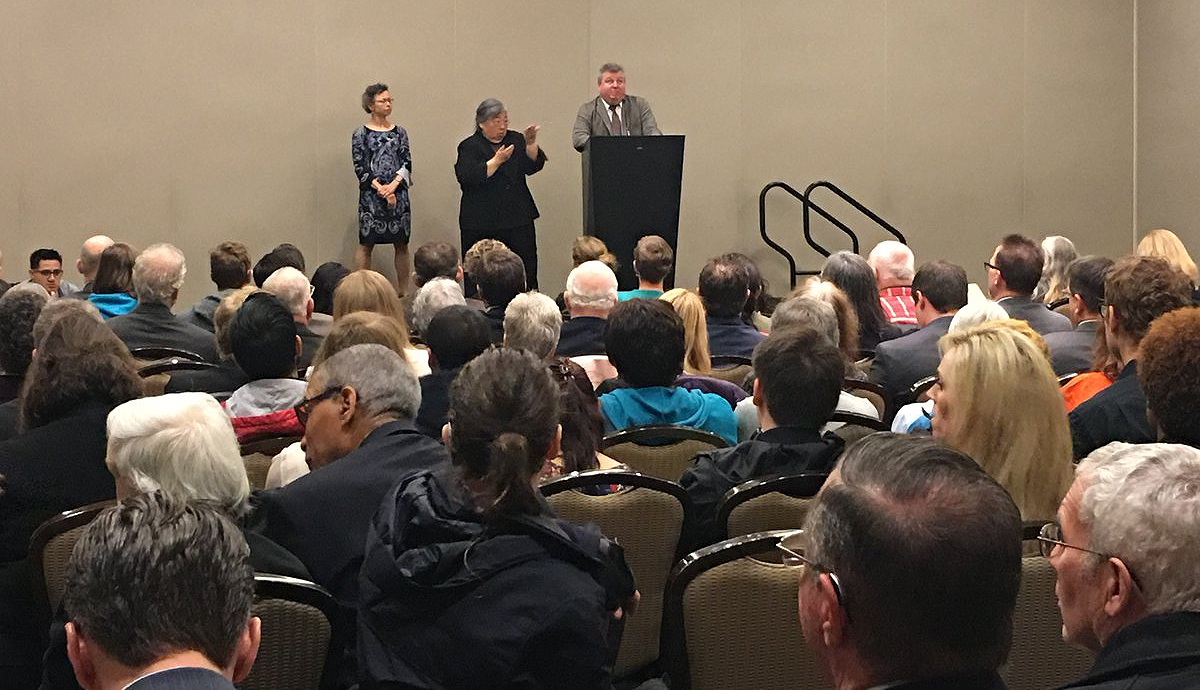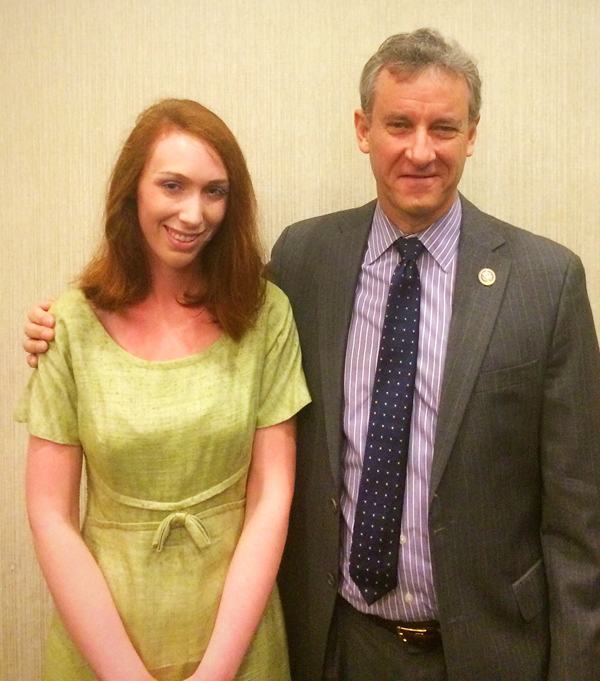My Perspective on the 2017 Cogswell-Macy Act Capitol Hill Day
March 7, 2017
For the second time, the American Foundation for the Blind, joined by other groups representing students who are deaf, hard of hearing, blind, visually impaired, or deafblind, held an advocacy day on Capitol Hill for the Cogswell-Macy Act. A vast and diverse group of advocates came from 29 states with the intent of convincing members of Congress to support a bill that would immensely help to give children with sensory disabilities an equal chance to excel in the classroom and beyond.
We kicked off our Hill Day with a briefing at the Hyatt Regency Hotel in Washington, DC. To see the convocation of so many people, all with the same goal, was elating. For weeks, I have been working hard with AFB’s policy center staff, especially Senior Policy Researcher, Rebecca Sheffield, to call congressional offices, put together meeting materials, and plan the agenda. As a new intern with AFB, the chance to work on a project of this magnitude in an independent manner was a unique and exciting experience. Over the course of my first five weeks, I felt truly immersed in the inviting culture of AFB and was given the opportunity to attend countless meetings, interact with congressional offices, and attain skills in accessibility as well as policy that I could have done nowhere else.
Having the event come together seamlessly was a relief as well as a thrill. While checking in our attendees to this briefing, it was difficult not to notice the air of cooperation among everyone in attendance. Undoubtedly, the deaf and blindness communities experience some challenges in communication. However, in that room, and with the aid of some fantastic interpreters, everyone was on the same page. During the briefing, we heard from several great speakers, including AFB’s own Public Policy Director, Mark Richert; Executive Director of the Conference of Educational Administrators of Schools and Programs for the Deaf (CEASD), Barbara Raimondo; and one surprise guest, U.S. Representative Matt Cartwright of Pennsylvania, who gave a rousing speech on the need for bipartisan cooperation for legislation such as the Cogswell-Macy Act. Mr. Cartwright, a Democrat, has been a champion of the Cogswell-Macy Act, along with David McKinley of West Virginia, a Republican.


Wrapping up at the Hyatt, we felt confident that all attending advocates had walked away with not only the information they needed to successfully promote the Cogswell-Macy to their representatives, but also with a refreshed energy to go out into the nation’s capital and drive their message home.
Accompanied by AFB’s Programs and Policy Coordinator, Sarah Malaier, I dropped in on several meetings that day. First stop was in Louisiana Senator Cassidy’s office, where we met with his senior policy advisor. The constituent from Louisiana made a strong case for the need for better education for children with sensory disabilities and enumerated the benefits of having those children join in the workforce. Senator Cassidy’s advisor was an invested listener, and expressed Senator Cassidy’s interest in the need for better education for children with disabilities, citing how passionate he is about finding a more inclusive method for public education.
From there, we made our way to North Carolina Senator Richard Burr’s office. We, along with staff and students from a School for the Deaf, met with one of Burr’s staffers. Here, it was the children who truly shone. Their touching stories of pursuing their dreams, coming to America, and struggling and achieving their goals in the classroom left a lasting impression, and imparted the need for better accessibility for Deaf students in public schools, so that they too can achieve their full potential.
On our final solo trip, Sarah and I joined Marjorie Kaiser, Superintendent of the South Dakota School for the Blind and Visually Impaired, and Barbara Raimondo in Senator Round’s office. Ms. Raimondo had many insightful points on the utility and benefit of better access to education for sensory disabled children, and Ms. Kaiser had an outstanding story to tell about the value of educating students with visual impairments. One of her students had graduated from her school equipped with the skills and knowledge to carry him through higher education to earn degrees in both Engineering and Medicine. Although his vision had been corrected after his graduation, his academic and career success would have been impossible without the work of well-trained teachers of students with visual impairments (TVIs) who had the tools to help him excel.
Senator Rounds’ staff were impressed by her story, and became deeply involved in the conversation about how Cogswell-Macy will be able to benefit children with all sorts of sensory disabilities, and how integral they will be to our workforce—surgeons or not.
At the end of the day, Mark Richert, Rebecca Sheffield, and I, along with other advocates, converged on Massachusetts Senator Markey’s office. The senator has agreed to sponsor the Cogswell-Macy Act in the Senate, and we wanted to thank him in person. In attendance were several members of staff to whom we explained some of the finer points of the bill. A few minutes later, the senator himself breezed in and gave a gracious and uplifting speech about what has been done, what needs to be done in the sensory disability community, and how he will be there to help in any way he can. A photo-op and a few handshakes later, our Hill Day came to a close.
While our feet may have been sore, our spirits were soaring. This Hill Day was a grand success, with over 130 unique advocates telling their stories. It is undeniable that the needs of students who are blind, deaf, and deaf-blind are now on the mind of many representatives and senators, and we hope this effort will influence their voting decisions in the coming years. For myself, this Hill Day represented togetherness—so many people working toward the same purpose, from many different perspectives and backgrounds.
Regardless of the legislative success of the Cogswell-Macy Act, this event strengthened the bonds between the sensory disability worlds and will enable all of us to better cooperate in the future toward similar goals for improving the lives of people who are blind, deaf, or deafblind. We at AFB will continue fighting for people with blindness and vision loss, and encourage everyone to participate in advocacy in any way they can. We sincerely hope you will continue supporting these causes, and consider joining in on our next advocacy day when the need arises!
